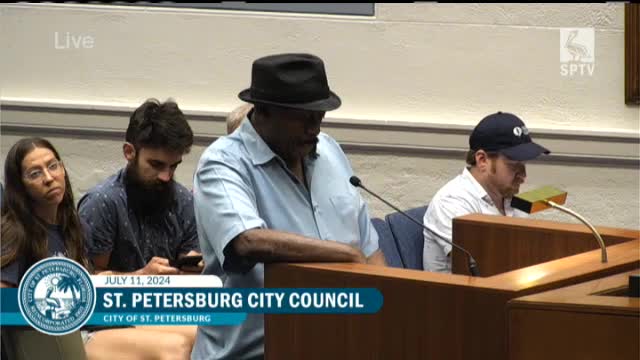City Council Faces Backlash Over Controversial Stadium Deal
July 11, 2024 | Saint Petersburg City, St. Petersburg County, Florida

This article was created by AI summarizing key points discussed. AI makes mistakes, so for full details and context, please refer to the video of the full meeting. Please report any errors so we can fix them. Report an error »

In a recent city council meeting, discussions centered on the controversial development agreement involving the Tampa Bay Rays and the proposed new baseball stadium. Council members and community advocates expressed significant concerns regarding the terms of the deal, which many described as inadequate and potentially detrimental to taxpayers.
Carrie Mueller, a former member of the Community Benefits Advisory Council, criticized the agreement, labeling it a \"corporate welfare scheme\" that would transfer valuable downtown real estate to the Rays for minimal compensation. She highlighted that the deal would require taxpayers to contribute $142 million for infrastructure while allowing the developer to avoid paying property taxes until individual parcels are developed. Mueller urged the council to reconsider the agreement, citing a Mason-Dixon poll indicating public discontent and calls for renegotiation.
Other speakers echoed these sentiments, emphasizing the need for more affordable housing and sustainable development practices. Tom Tito pointed out that the current proposal lacks firm requirements for affordable housing and sustainability certifications, while Madison Rice compared the deal unfavorably to previous proposals that offered more open space and housing units.
The council also heard from residents advocating for changes to the city’s landscaping code, which they argue imposes financial burdens on homeowners wishing to adopt eco-friendly practices. Darla Austensen and Jeanine Lessman called for the removal of requirements that necessitate hiring landscape architects, which they believe contradicts the city’s goals for sustainable living.
As the meeting progressed, Mayor Welch presented the recommended budget for fiscal year 2025, highlighting priorities such as affordable housing, public safety, and environmental resilience. The budget proposes a slight reduction in the millage rate and emphasizes investments in community programs and infrastructure improvements.
The council's deliberations on the Rays' development agreement and the budget reflect ongoing tensions between community needs and corporate interests, with many residents advocating for a more equitable approach to urban development. The council is expected to continue discussions and potentially vote on the agreement in the coming weeks, as public sentiment increasingly calls for transparency and accountability in city planning.
Carrie Mueller, a former member of the Community Benefits Advisory Council, criticized the agreement, labeling it a \"corporate welfare scheme\" that would transfer valuable downtown real estate to the Rays for minimal compensation. She highlighted that the deal would require taxpayers to contribute $142 million for infrastructure while allowing the developer to avoid paying property taxes until individual parcels are developed. Mueller urged the council to reconsider the agreement, citing a Mason-Dixon poll indicating public discontent and calls for renegotiation.
Other speakers echoed these sentiments, emphasizing the need for more affordable housing and sustainable development practices. Tom Tito pointed out that the current proposal lacks firm requirements for affordable housing and sustainability certifications, while Madison Rice compared the deal unfavorably to previous proposals that offered more open space and housing units.
The council also heard from residents advocating for changes to the city’s landscaping code, which they argue imposes financial burdens on homeowners wishing to adopt eco-friendly practices. Darla Austensen and Jeanine Lessman called for the removal of requirements that necessitate hiring landscape architects, which they believe contradicts the city’s goals for sustainable living.
As the meeting progressed, Mayor Welch presented the recommended budget for fiscal year 2025, highlighting priorities such as affordable housing, public safety, and environmental resilience. The budget proposes a slight reduction in the millage rate and emphasizes investments in community programs and infrastructure improvements.
The council's deliberations on the Rays' development agreement and the budget reflect ongoing tensions between community needs and corporate interests, with many residents advocating for a more equitable approach to urban development. The council is expected to continue discussions and potentially vote on the agreement in the coming weeks, as public sentiment increasingly calls for transparency and accountability in city planning.
View full meeting
This article is based on a recent meeting—watch the full video and explore the complete transcript for deeper insights into the discussion.
View full meeting